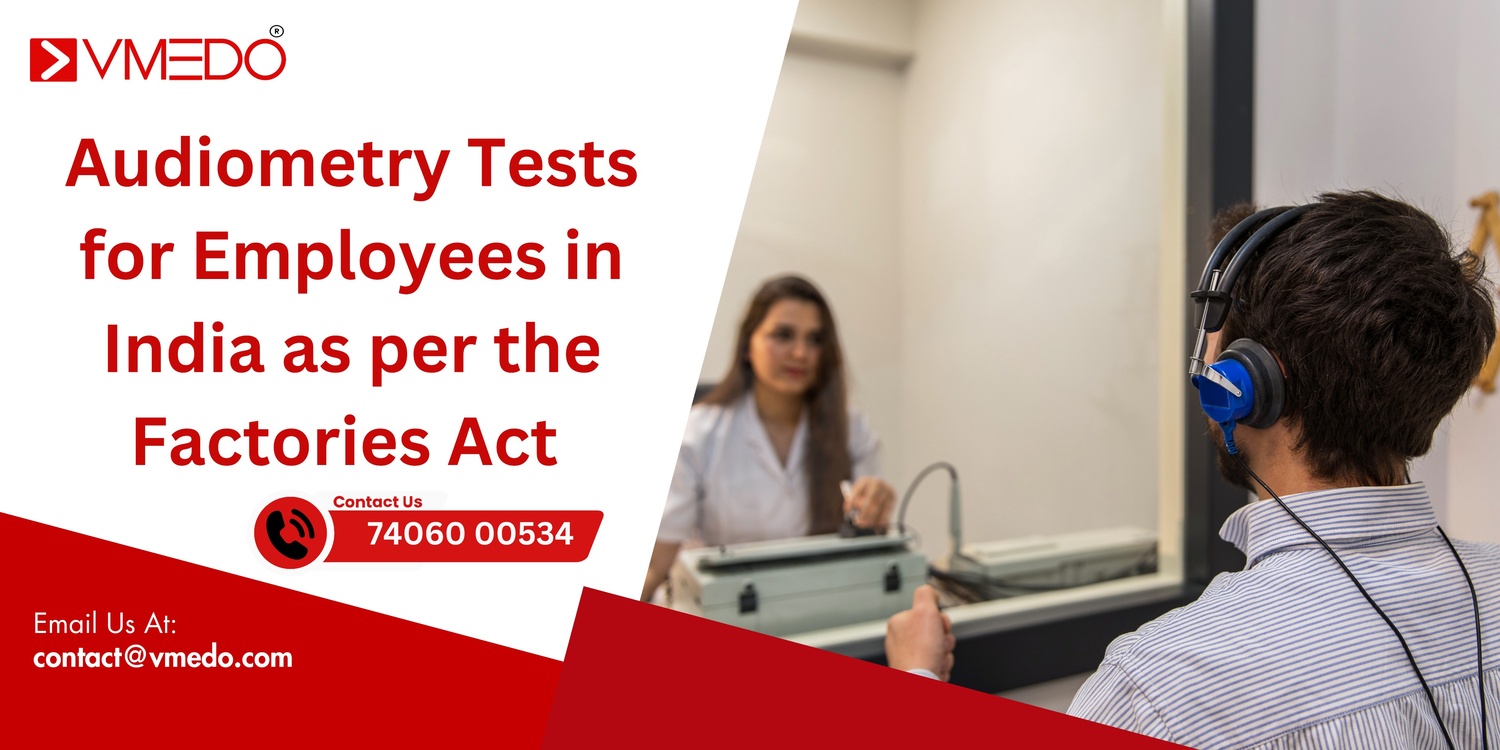In workplaces with high noise levels, employee hearing health is a priority. Audiometry testing is essential to ensure employees’ auditory well-being, particularly in industries like manufacturing, construction, and aviation. This blog explores why audiometry tests are vital, what they involve, and how they can benefit employees and employers alike. VMEDO provides comprehensive audiometry tests that help companies stay compliant with health regulations while safeguarding employee health. Contact now at +91 74060 00534.
What Is an Audiometry Test?
An audiometry test is a hearing test that measures a person’s ability to hear various sounds, pitches, and frequencies. The test typically involves the use of an audiometer—a medical device that plays sounds through headphones to assess hearing sensitivity.
During an audiometry test, an individual listens to a series of tones at different pitches and volumes, to determine the softest sound they can hear at each frequency. The results are charted on an audiogram, a graphical representation of a person’s hearing thresholds. The test is non-invasive, simple, and quick, taking only about 15-30 minutes to complete.
There are two main types of audiometry tests:
- Pure-tone audiometry: This is the most common form of hearing test, where the individual listens to tones at different frequencies and volumes to assess the hearing threshold.
- Speech audiometry: In this test, the ability to hear and understand speech is measured. This is often used alongside pure-tone audiometry to get a comprehensive assessment of hearing ability.
Why Audiometry Tests are Crucial for Employees
- Occupational Health Compliance: Many regulatory standards, like the Factories Act, mandate routine hearing checks for employees exposed to loud environments. Non-compliance can result in penalties and legal issues.
- Early Detection of Hearing Loss: Routine audiometry tests can detect hearing impairments early, allowing employees to seek timely treatment or use protective equipment.
- Enhanced Productivity: Employees with good hearing are more likely to perform efficiently, communicate effectively, and avoid accidents related to impaired hearing.
- Employee Well-being and Morale: Showing concern for employee health fosters a positive work environment, leading to higher morale and job satisfaction.
When Should Audiometry Tests Be Conducted?
- Pre-employment: Assessing hearing levels before joining ensures baseline data and detects any pre-existing conditions.
- Periodic Testing: Regular intervals, often annually, are recommended for employees in high-noise environments.
- Post-Exposure: After significant noise exposure, like an equipment malfunction, testing ensures no immediate damage occurs.
- Exit Testing: When employees leave, an exit test documents hearing health status at departure.
Which type of companies need audiometry tests?
Audiometry tests are typically required by companies that expose their employees to high levels of noise, as prolonged exposure to loud sounds can lead to hearing loss. These tests help monitor and protect employees’ hearing health. Companies that commonly require audiometry testing include:
-
Manufacturing and Industrial Companies:
- Factories, construction sites, and any workplace where loud machinery or equipment (e.g., heavy-duty machines, presses, or power tools) is in use.
-
Mining and Quarrying:
- Mining operations, both surface and underground, often have high noise levels from machinery, explosives, and equipment.
-
Construction:
- Sites where heavy construction equipment, such as jackhammers, cranes, and bulldozers, generate high noise levels.
-
Transportation and Aviation:
- Airports, airlines, and air traffic control centers, where noise from aircraft engines and ground equipment is prevalent.
- Shipping and rail companies where exposure to engine noise, horns, and other loud sounds is common.
-
Entertainment and Music Industry:
- Concert venues, nightclubs, and audio production environments where employees may be exposed to high volumes of sound for extended periods.
-
Emergency Services:
- Fire stations, police stations, and ambulance services, where loud sirens and alarms may create high noise exposure.
-
Utilities:
- Power plants, especially those involved in the generation of electricity, where turbines and generators produce significant noise.
-
Military and Defense:
- Military personnel, especially those involved in operations with aircraft, heavy artillery, or explosives, may require regular audiometry tests due to the high noise levels in their environment.
-
Agriculture:
- Farms and agricultural settings that use loud machinery, such as tractors and harvesters.
-
Printing and Textile Industries:
- Environments where large-scale printing presses or textile machines operate, generating sustained high noise levels.
Benefits of Implementing Audiometric Testing in the Workplace
- Better Health Outcomes: By detecting hearing issues early, employees can receive timely treatment and avoid further hearing impairment.
- Compliance and Risk Management: Audiometric testing helps employers stay compliant with health and safety regulations, minimizing the risk of penalties and lawsuits.
- Enhanced Productivity: Healthy employees are more productive. By preventing hearing loss, businesses can ensure that employees remain effective communicators and active participants in their roles.
- Reduction in Worker Compensation Claims: Early intervention can prevent more severe hearing-related disabilities, reducing the likelihood of costly workers’ compensation claims.
- Improved Employee Satisfaction: Offering audiometric testing and hearing protection demonstrates that the company is committed to the well-being of its employees.
Understanding Audiogram Results
- Normal Hearing: Typically ranges from -10 to 25 decibels.
- Mild Hearing Loss: 26 to 40 decibels; may impact some workplace communication.
- Moderate to Severe Loss: Over 40 decibels, requiring interventions or possible reassignment.
How to book audiometry tests for employees
- Identify Need: Determine which employees need testing, especially those in noisy environments.
- Choose Provider: Select a certified audiometry testing provider (e.g., VMEDO).
- Contact Provider: Reach out to VMEDO to schedule the test, providing details like the number of employees and preferred dates.
- Prepare Employees: Advise employees to avoid loud noises for 14 hours before the test.
- Confirm Details: Finalize the cost, and terms, and report delivery with the provider.
To book an audiometry test visit our website VMEDO Or contact us at +91 74060 00534.
VMEDO Services
- Annual Health Checkups for Employees (Factories Act Compliance) in India
- Pre-Employment Health Checkups in India
- Lung Function/PFT Tests for Employees in India
- Blood Tests for Employees (Factories Act Compliance) in India
- ECG Tests for Employees in India
- Audiometry Tests for Employees in India
- Eye/Vision Tests for Employees in India
- Medical Fitness Certificates (Factories Act Compliance)in India
- HIV/HBs Tests for Employees in India
- Chest X-Rays for Employees in India
- Hepatitis B Vaccinations in India
- HPV Vaccinations in India
- Tetanus (TT) Vaccinations in India
Frequently Asked Questions (FAQs) Audiometry Tests for Employees:
1. What is Audiometry Testing?
Audiometry testing measures an employee’s hearing ability by assessing their response to various sounds and frequencies. It helps detect hearing loss early, especially in noisy work environments.
2. Why is Audiometry Testing Important for Employees?
It helps protect employees’ hearing health, ensures compliance with workplace safety regulations, and prevents hearing-related issues due to prolonged noise exposure.
3. How Often Should Audiometry Tests Be Done?
Tests should be conducted pre-employment, periodically (usually annually), post-exposure to loud noises, and at exit points for employees.
4. How Do I Book an Audiometry Test?
Contact a certified provider like VMEDO to schedule a test. Provide details on the number of employees and preferred dates.
5. What Should Employees Do Before the Test?
Employees should avoid loud noises for at least 14 hours before the test for accurate results.
6. Where Can Audiometry Tests Be Conducted?
Tests can be done on-site at your workplace or at a certified clinic. Many providers offer on-site testing for convenience.
7. What Happens After the Test?
Employees will receive a report of their hearing levels, and any signs of hearing loss will be addressed with recommendations for protective measures.
8. Cities VMEDO operates?
Bangalore, Chennai, Hyderabad, Mumbai, Kolkata, Pune, Ahmedabad, Delhi, Kochi.



